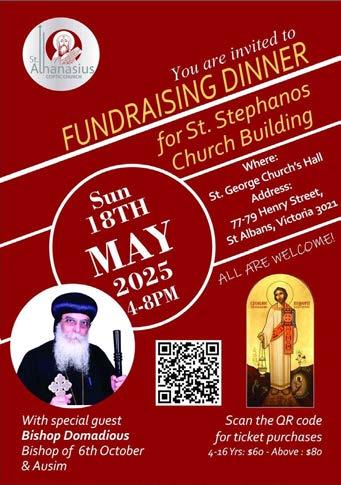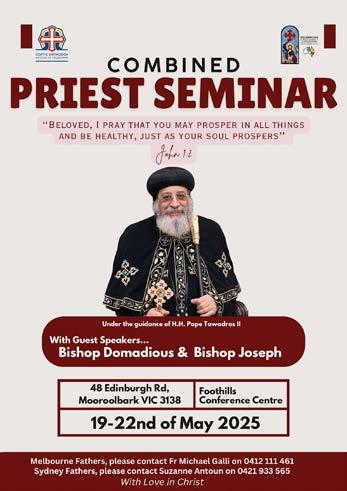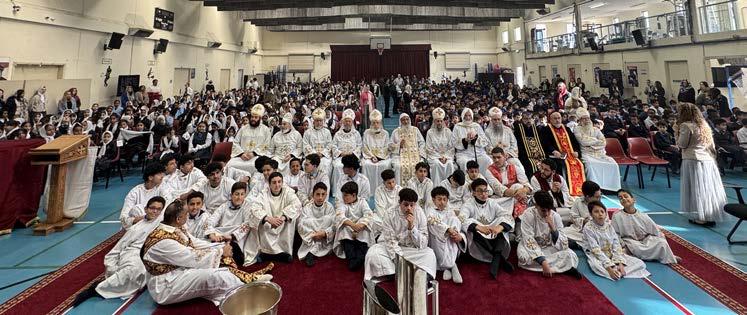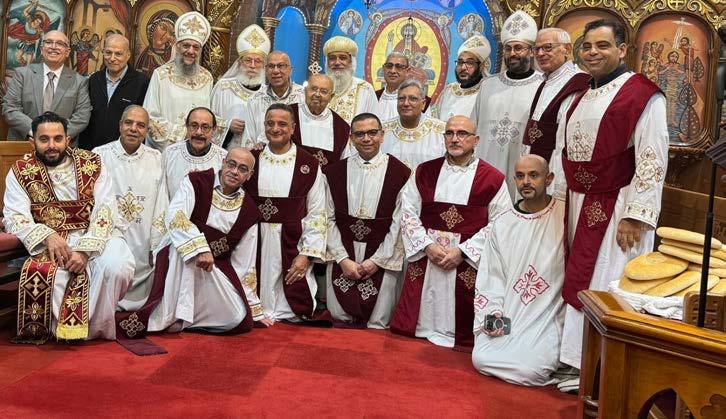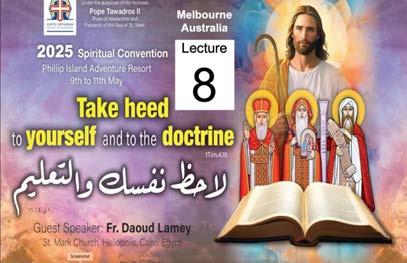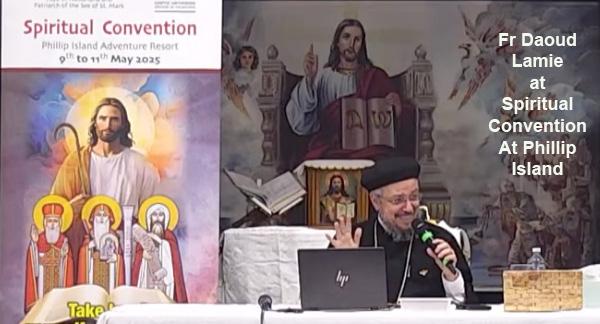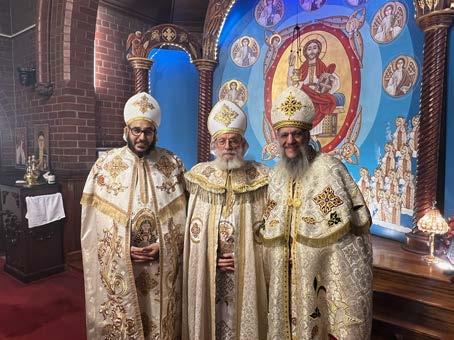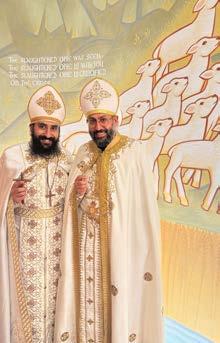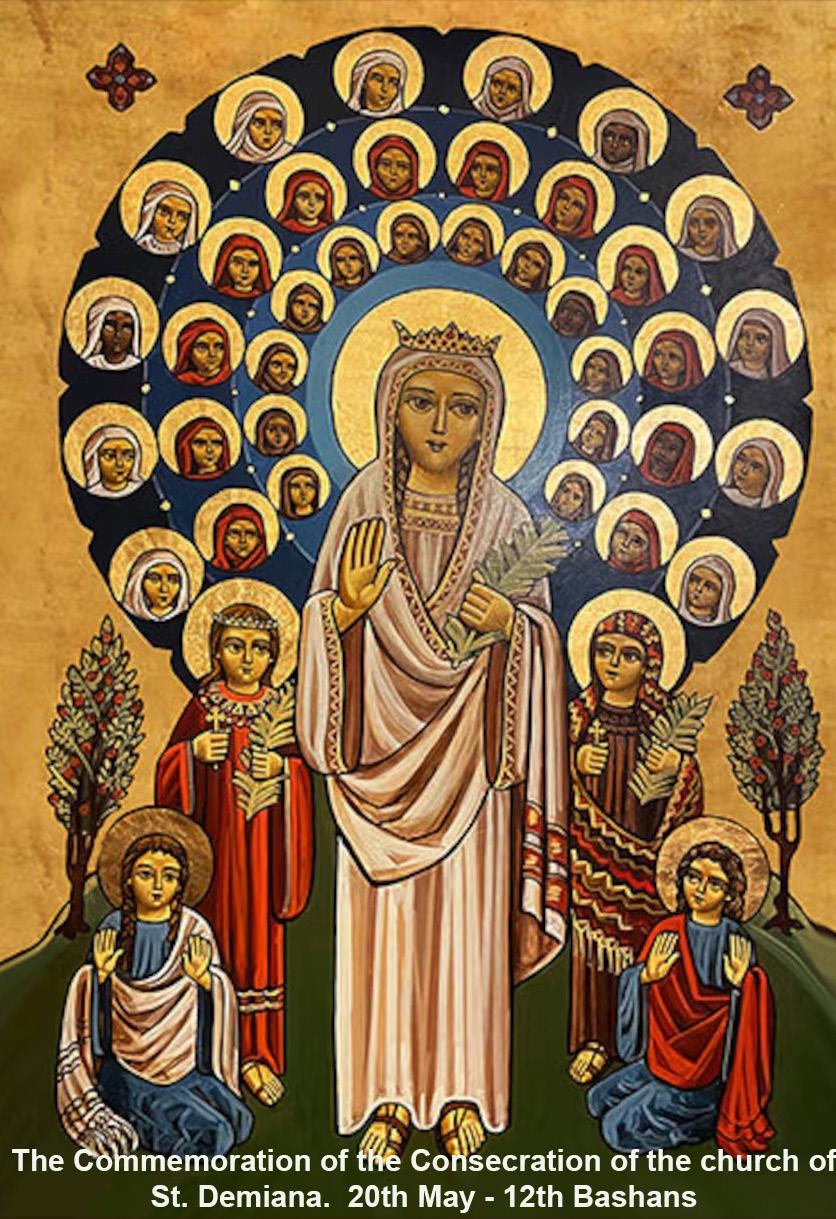
The Departure of the Three Hebrew Young Men Hananiah, Azariah and Mishael.
18th May - 10th Bashans
On this day is the commemoration of the departure of the three young men the Saints: Hananiah )Ananias(, Azariah )Azarias( ) (, and Mishael )Misael(. These Saints were the sons of Jehoiakim ) (. king of Judah. They were exiled by Nebuchadnezzar to Babylon. When Nebuchadnezzar chose some of the exiled young men to be in his service. These young men and Daniel, their cousin, among those who were chosen. Ashpenaz the master of the eunuchs gave them other names: he gave Daniel the name Belteshazzar, to Hananiah : Shadrach; to Mishael : Meshach; and to Azariah : Abed-Nego. These young men purposed in their heart that they would not defile themselves with the portion of the king’s delicacies, nor with the wine which he drank; therefore they requested of the chief of the eunuchs that they might not defile themselves. The chief of the eunuchs said to them, “I fear my lord the king, who has appointed your food and drink. For why should he see your faces looking worse than the young men who are your age? Then you would endanger my head before the king.” They said to the steward whom the chief of the eunuchs had set over them: “Please test your servants for ten days, and let them give us vegetables to eat and water to drink. Then let our countenances be examined before you, and the countenances of the young men who eat the portion of the king’s delicacies; and as you see fit, so deal with your servants.” So he consented with them in this matter, and tested them ten days. And at the end of ten days their countenance appeared better and fatter in flesh than all the young men who ate the portion of the king’s delicacies. As for these four young men, God gave them knowledge and skill in all literature and wisdom; and Daniel had understanding in all visions and dreams. Now at the end of the days, when the king had said that they should be brought in, the chief of the eunuchs brought them in before Nebuchadnezzar. When the king interviewed them, and among them all none was found like Daniel, Hananiah, Mishael, and Azariah; therefore they served before the king. And in all matters of wisdom and understanding about which the king examined them, he found them ten times better than all the magicians and astrologers who were in all his realm, and he appointed them governors on all the provinces of Babylon. )Daniel 1:8-20( ( When the king made an image of gold, and the three Hebrew young men did not worship it, those envious of them, accused them before the king that they did not worship the image. The king brought them and asked them about that and they confessed that they only worship the true God. He commanded them to be casted in a burning fiery furnace. The Lord sent His angel, who protected them and made the fire as a cool dew although it burnt the men that threw them in the fiery furnace. When the king saw that, he believed in their God and promoted them in the province of Babylon. On the tenth day of Bashans, while they were praying, and kneeling down, they gave up the spirit at the hand of the Lord. A great earthquake occurred. The king was terrified, and inquired from Daniel about what had happened, who told him that the three Hebrew young men had died. The king came to the place and mourned them. He ordered that three beds made of ebony be made, and their bodies be wrapped in silk, and then placed on the beds. He also ordered a bed made of gold
for himself, so that when he died, they would place him on it among them.
Pope Theophilos, the 23rd. Patriarch, built a church after their names and wanted to relocate their bodies to it. He delegated St. John the short and sent him to Babylon. When he arrived to the place where they were buried, he heard a voice saying: “The Lord has ordained that our bodies remain in this place, but because of your labor of love, when you return, say to the Patriarch to fill the oil lamps with oil on the night of the consecration of the church, and the power of God will be revealed.” When he returned, and told the Pope, he did as he was commanded, and the oil lamps )Kandeels( lighted up. Kandeels They glorified God, and completed the consecration after the names of these Saints.
May their prayers be with us and glory be to God forever. Amen.
The Commemoration of the Consecration of the church of St. Demiana.
20th May - 12th Bashans
On this day, the church commemorates the consecration of the church of the virgin St. Demiana. This pure and fighting virgin was the daughter of Mark, who was the governor of El-Borollus, El-Zaafran and the valley of Saisaban. She was the only child of her parents. When she was one year old, her father took her to the church that was in the monastery of El-Maima. He offered gifts there so that God might bless this daughter and keep her safe Him. When she was fifteen years old, her father wanted to get her married. She refused and told him that she had vowed herself a bride for the Lord Christ. When she found that her father was pleased of her decision, she asked him to build her an isolated palace, so that she could worship God with her virgin friends, and right away he did what she asked. He built the palace where she and the forty virgins lived in. They spent their time by reading the Holy Bible and praying fervently to God.
Shortly after, Emperor Diocletian sent for Mark her father and ordered him to worship the idols, but he refused at first. However, after some persuasion, Mark obeyed him and worshipped the idols, forsaking the creator of the universe. When Mark returned, and St. Demiana knew of what her father had done, she rushed to meet him without a greeting saying: “What have I heard about you? I wished I have Heard the news of your death, and not knowing that you have forsaken God who have created you and worshipped what is made by hands. If you insist on what you have done and you do not relent by denouncing the idols, you are not my father, and I am not your daughter.” She also said to him: “It is better for you, O my father, that you die a martyr and live with Christ in heaven forever, than you live as a pagan here and die with the devil in hades forever.” Then she left him. Her father was moved by what she said and wept bitterly. He went in hurry to Diocletian and confessed the Lord Christ before him. When Diocletian could not change his mind, he ordered him to be beheaded.
When Diocletian knew that the one who turned Mark away from worshipping the idols was his daughter Demiana, he sent to her a prince to persuade her at first, and if she did not obey, he would cut off her head. The Prince came to her with an entourage of one hundred soldiers armed with all instruments of torture. When he arrived to her palace, he went to her and
said: “I am an envoy sent by Emperor Diocletian. I came to ask you, according to his orders, to worship his gods, so he might grant you whatsoever you wish.” St. Demiana shouted at the prince saying: “Curse the messenger and he who sent him. Are you not ashamed to call stones and wood gods that only dwelt by devils? There is no other God in heaven or on earth except the one God, the Father, the Son and the Holy Spirit, the Creator, Who has no beginning and no end, the Omnipresent, and the Omniscient God, who will throw you in hell for eternal condemnation. As for me, I worship my Lord and Savior Jesus Christ and His Good Father and the Holy Spirit, the Holy Trinity. I profess Him, depend on Him, and in His name I die and by Him I will live forever.”
The Prince became angry of what she said, and ordered her to be placed in the body press. Her blood poured out on the ground, and the virgins were standing, weeping for her. Then they put her in prison, where the angel of the Lord appeared to her and touched her body with his celestial wings and healed her from all her wounds.
The Prince was creative in the ways he tortured St. Demiana, sometimes by rending her flesh, or placing her in boiling grease and oil. In all that, the Lord strengthened her and raised her up whole. When the Prince saw that his efforts were of no avail and the steadfastness of this pure virgin, he ordered her to be beheaded with all the virgins with her. They all received the crowns of martyrdom. )The account of her martyrdom is mentioned in the 13th day of Tubah( The Prince returned to Antioch, the city of the Emperor. The faithful came and gathered the bodies of the martyrs and kept them until the end of the days of persecution and the reign of the righteous Emperor the Christ-loving Constantine the great. He ordered to destroy the idol temples and built many churches after the names of the martyrs. He gathered the bodies of the martyrs in every place and placed them in the churches. He endowed the churches with the necessary income to maintain them.
When Constantine knew of all what had happened to St. Demiana, and how she endured for a long time in the valley of El-Saisaban, he delegated his blessed mother St. Helena to take burial clothing, go to El-Zaafran, and build a church in the name of St. Demiana and the forty virgins, there. St. Helena came to the valley, went up to the palace, and found that the bodies were unharmed. She found St. Demiana in the place where she used to sit and around her the forty virgins. She kissed the body, taking the blessing of the Saint and wrapped the bodies with expensive shrouds. She gathered the craftsmen and architects, tore down the palace, and built instead a well built tomb )Cellar( underground. She laid the body of St. Demiana on an ivory bed, and covered her with a precious bedspread and laid the forty virgins around her in it. Then she built a small and beautiful church which had one dome on the top of it. The church was consecrated by Pope Alexandros, the nineteenth Patriarch of Alexandria, on the 12th. of Bashans. He also ordained a saintly bishop, priests, and deacons to serve in the church day and night in prayers.
The bishop of this area, El-Zaafran and El-Borollus, was martyred and his body was placed in this church among the bodies of other martyrs. Abba Yoannis, Bishop of El Bor-
Fourth week of Pentecost
John 12: 35-50
Today, Sunday, 30th May 2021 - 22nd Basans 1737 is the fourth Sunday of the Holy Pentecost.
The Pauline Epistle: 2 Thessalonians 2: 13-3: 5 “Therefore, brethren, stand fast and hold the traditions which you were taught.” Catholicon 1 John 4: 7-13 “Everyone who loves is born of God and knows God. He who does not love does not know God, for God is love.”
The Acts: Acts of the Apostles 14: 8-23. He did not leave Himself without witness, in that He did well, gave us rain from heaven and fruitful seasons, filling our hearts with food and gladness.”
The Holy Gospel: John 12: 35-50 “The light is with you for a short time, so walk in the light lest the darkness overtake you.”
In the Gospel of the Mass today, the Lord Jesus talks about the light. He asks us to walk in the light and believe in it and to become children of the light. The Lord is the light of the world and whoever believes in Him does not remain in darkness )John 12:35 -50( How astonishing that the Lord is talking about the light in the midst of a world, that does not love the light; a world that has lost the light in its heart. Perhaps a person is concerned with the light of the body or the light of the material mind, but he has left his soul wandering in a painful and frightening darkness. The actions of the people of the world have become stemming from darkness heart; the god of this age has blinded their eyes and hardened their hearts so that they do not see with their eyes and feel with their hearts and return to the Lord and heal them. They loved the glory of people more than the glory of God. There are three examples of the darkness of the heart in which a person lives today.
The hardness of the heart, The abomination of the flesh, and haughty living.. Any one of them destroys a person completely, how bad could it be if someone was afflicted with all of them? It is really horrific and
deadly darkness that makes the children of God walk today in the midst of this darkness and the tongue of their condition repeats the psalm: If I walk in the valley of shadow of death, I fear nothing. Hardness of heart is expressed in the Bible ‘their hearts are hardened’. It is the loss of love and the absence of inner peace. The hardness that caused Cain to stand against his brother and kill him, that made Saul the king stand against David and want to kill him. The cruelty that made the rich man leave Lazarus at his door struck by diseases without mercy, that causes sinners to hold stones and want to stone a sinful woman who was caught in adultery. The act which makes the stubborn people demand that a murderer be granted to them and the Prince of Peace to be handed over to death, crying, “Crucify Him, crucify Him, His blood be on us and on our children”. Hardness of heart that made the people at a time almost offer sacrifices to Paul, believing that ` is a god and one day later they beat him and dragged him out of the city thinking that he was dead. How horrible is the hardness of the heart, it makes the father hate his children and the brother be hostile to his brothers and reject them. It makes the husband becomes violent to his wife and makes the wife drag her husband before the courts. It makes the children neglect their parents in their old age or their illness or the time of their need. The hardness of the heart has become everywhere. See massacres everywhere in the world, violence, persecutions, torture, cruelty, bullying and tyranny; it is truly the darkness of the heart.
As for the abomination of the flesh: it is the mind darkness. The wise Solomon is calling someone who rushes in its path that he has lost his mind; it is a removal from human nature. Indeed it is the blindness of the inner eyes; the world has blinded their eyes so that they do not see or be healed, hence, God gave them over to a debased
mind and delivered them to Satan for the destruction of the flesh who strikes them with incurable diseases. O that they may repent! Instead of ceasing their fornication and evil, you find them astonishingly looking for ways to make them continue in sin, trying to avoid its consequences; extreme darkness. If the roots were not taken off you won’t be able to prevent weeds from growing.
Haughty living: the eyes of people are blinded; all that matters to them today is covetousness, they want and crave the relaxation of the body and a glorification of living
A person whose best dream was to own a small car; Today, two cars are not sufficient for him, but he wants more and is not satisfied. It is the grinder that grinds a person, blinds his heart and eyes, and makes him neglect the most important thing, which is the salvation of the soul. You have attained the light by baptism so be careful to live in the light. Step away from those who love darkness and unfruitful works of darkness. The world is passing today in a very dangerous phase. Perhaps the days of the Antichrist have approached and these are the days in which the devil will make people go astray, even if the elect. Be like the wise virgins; stay watchful, acquire the oil of grace, keep your lamps lit and ready with much oil in your lamps. Acquire virtues, teachings, the word of God and spiritual strife. God’s statutes are eternal life to us. How can you sacrifice all of these for the sake of a temporary and fleeting life? Walk in the light as long as you have the light.
The light is with you for a short time; the time of light is short, too short to waste it in the hardness of the heart, the abomination of the flesh, and haughty living. Soon there comes a time that you find yourself in the darkness of the grave; darkness where there are neither movement nor hope. So walk in the light as long as you have the light, lest the darkness overtake you. As long as you have the light, believe in the light, so that you may become children of the light. ++++


